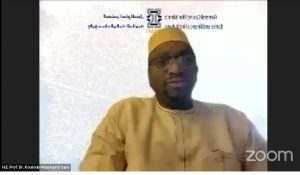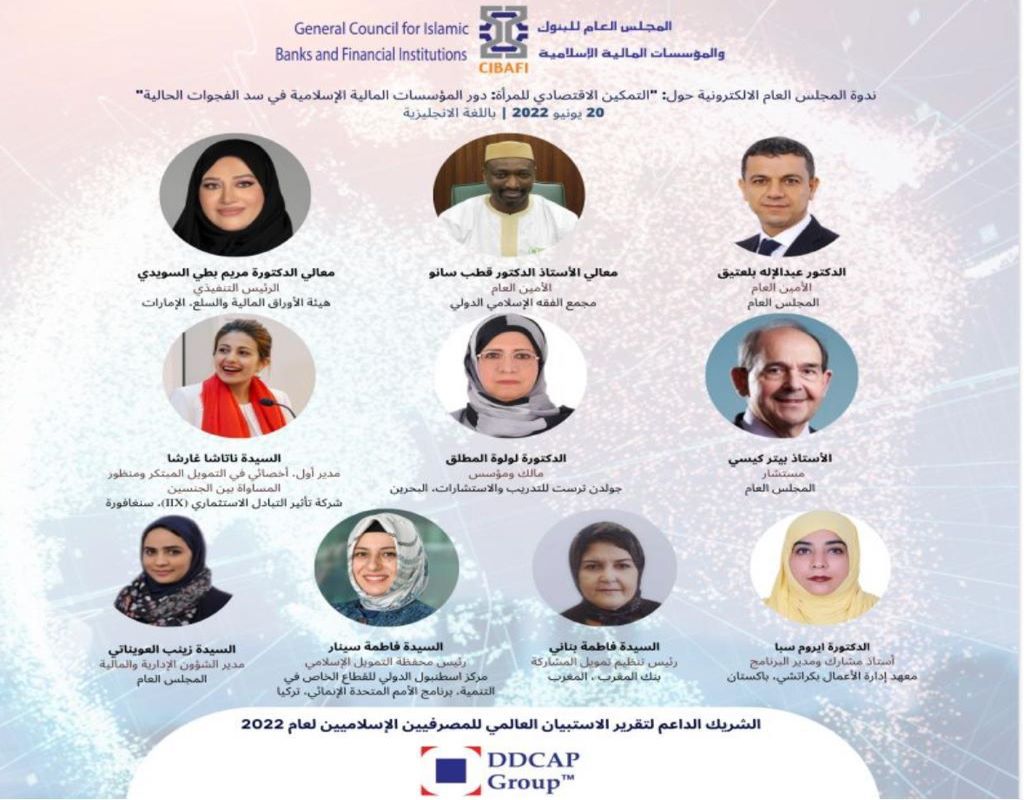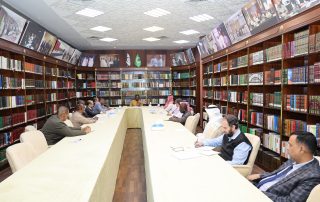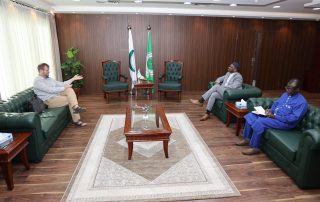
His Excellency Prof. Koutoub Moustapha Sano, Secretary General of the International Islamic Fiqh Academy (IIFA), delivered a keynote speech at the opening of the scientific virtual symposium organized by the General Council of Islamic Banks and Financial Institutions (CIBAFI) under the title “Women’s Economic Empowerment: The Role of Islamic Financial Institutions in Bridging the Current Gaps”, on Monday 21 Dhu al-Qi’dah 1443H, corresponding to 20 June 2022G.
At the beginning of his speech, His Excellency thanked the organizers of this event for choosing the topic of the symposium, which is one of the sensitive and important topics and issues in the Muslim world and in a large number of other countries, stressing that “the issue of women’s active and comprehensive participation in the development of various aspects of life socially, culturally, politically and economically, is a religious obligation, a modern necessity, and a temporal interest, because Shariah did not differentiate between a male or a female in the field of righteous deeds, but promised each one of them a good life if they did a righteous deed as the Almighty says: ((Whoever does good, whether male or female, and is a believer, We will surely bless them with a good life, and We will certainly reward them according to the best of their deeds.)) {Surat An-Nahl, Verse: 97.} Accordingly, achieving women’s economic empowerment is essential to achieving prosperity and economic growth in any society. His Excellency pointed out that “Despite the great efforts that have been made over the years in many of our Muslim countries to empower women, provide them with the necessary skills and provide them with equal opportunities to reach economic emancipation, there is still a need for more work to bridge the gaps in women’s economic integration and their participation in economic activity, whether at the level of production, investment or distribution.”
His Excellency added that Shariah has preserved all economic rights of women for a long time, and urged their good education and upbringing, and their active participation in the development of the economy, and the active contribution to the creation of national wealth. Shariah also considered her the man’s partner in the process of building and renaissance of nations and ordered her to perform duties not different from the duties assigned to her brother the man, emphasizing the importance of the contribution of both sexes to achieving renaissance, progress and development. His Excellency affirmed, “the teachings of the true Islamic religion guaranteed women all the political, economic, social, educational and cultural rights that were guaranteed to their male brothers. The Holy Quran says: ((The believers, both men and women, are guardians of one another. They encourage good and forbid evil)) {Surat At-Tawbah, Verse: 71.} and ((Whoever does good, whether male or female, and is a believer, We will surely bless them with a good life)) {Surat An-Nahl, Verse: 97}. The true Islamic religion has always been a forerunner to give women all their legitimate and civil rights, such as their right to education, health and work, which means that there is no relationship between Islam and the practices and abuses that demean women and infringe on their rights and exclusion.”
At the conclusion of his speech, His Excellency referred to the daily challenges faced by Muslim women in social, economic and political life, or at the level of opportunities that should be exploited to enable them to contribute to advancing development. His Excellency called on Islamic financial institutions to play a pivotal role in empowering women and bridging the huge gaps that exist between men and women in this regard. His Excellency stressed that this can be done through the provision of customized financial services and digital offers that take into account the needs of women and increase their access to financing that enables them to engage in entrepreneurship and create wealth and jobs. Financial institutions can also contribute by increasing the representation of women in the workplace and creating appropriate environments for their advancement and assuming leadership positions worthy of their educational level and practical experience.
It should be noted that the symposium brings together a number of international experts to discuss the issue of women’s economic empowerment and the role of Islamic financial institutions in achieving it. The webinar also looks at understanding the critical factors for women’s economic empowerment and the obstacles to achieving it. The symposium also examines the tools of Islamic financial institutions to achieve the economic empowerment of women and the opportunities that this provides for economic and sustainable development.
Read Also
Lastest








